|
|
|
Sort Order |
|
|
|
Items / Page
|
|
|
|
|
|
|
| Srl | Item |
| 1 |
ID:
112404
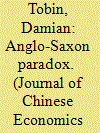

|
|
|
|
|
| Publication |
2012.
|
| Summary/Abstract |
Corporate governance is now a key concern in China's banking sector. Its importance is related to the important policy questions of how to foster economic growth without increasing inflation in an environment where monetary guidance does not function in a conventional manner and there exist few constraints on bank lending. Under such an environment top-down best practice models offer considerable appeal, but their implementation in China's banking sector suffers from a reform deficit. In this context, this study argues that innovative reforms that draw on existing institutions and expertise such as the reform of the China Postal and Savings Bank and the relaxation of restrictions on foreign banks in the rural sector indicate a unique and policy-driven response to this conundrum. Their advantage is that they provide the state with a ready-made platform to influence economic activity in the rural economy.
|
|
|
|
|
|
|
|
|
|
|
|
|
|
|
|
| 2 |
ID:
093850
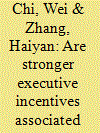

|
|
|
|
|
| Publication |
2010.
|
| Summary/Abstract |
This study examines whether firms incorporated in mainland China benefit from cross-listing in Hong Kong, China. The Hong Kong Stock Market has more stringent rules regarding corporate governance and a better system of investor protection than the mainland market. Hong Kong companies generally provide strong incentives to executives via equity-based compensation. Have cross-listed companies learned from Hong Kong firms about adopting these strong executive incentives? The evidence from this study suggests that changes in top executive compensation are more sensitive to sales growth in cross-listed firms than they are in mainland firms without cross-listing. However, compared to Hong Kong firms, cross-listed firms are less sensitive to stock returns. Further, this study shows that it is necessary to differentiate between state-owned companies and private companies, as cross-listing may have a greater impact on executive incentives in state-owned companies than it does in private companies.
|
|
|
|
|
|
|
|
|
|
|
|
|
|
|
|
| 3 |
ID:
159410


|
|
|
|
|
| Summary/Abstract |
The present article makes an attempt to empirically examine the linkage between
board composition and financial performance of the listed Indian and Chinse
firms spanning over the period from 2010 to 2014. Board composition comprises
of the four variables, namely, board size, auditors’ quality, CEO duality
and proportion of independent directors on the board. The study finds that for
Indian firms, the separation between the chief executive officer (CEO) and the
chairperson does have positive impact on the firms’ return on equity (ROE),
while for the Chinese firms, the proportion of independent directors on the
board does significantly influence ROE of the firms. Firms with higher proportion
of independent directors on their boards experience greater ROE. However,
auditors’ quality and board size are not found to have any impact on the ROE of
the firms of either country.
|
|
|
|
|
|
|
|
|
|
|
|
|
|
|
|
| 4 |
ID:
115612
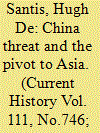

|
|
|
|
|
| Publication |
2012.
|
| Summary/Abstract |
America's expanding military footprint in Asia may be more of a provocation than a deterrent to China's aggressive behavior.
|
|
|
|
|
|
|
|
|
|
|
|
|
|
|
|
| 5 |
ID:
093839
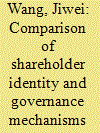

|
|
|
|
|
| Publication |
2010.
|
| Summary/Abstract |
This paper compares the relative effectiveness of two measures by which the Chinese government attempted to improve the monitoring of listed companies: shifting the ownership of state shares from government agencies (GAs) to the corporate form of state-owned enterprises (SOEs), and strengthening corporate governance through statutory regulations and guidelines. The results show that SOEs are better able than GAs to monitor top executives, as indicated by a higher sensitivity of top executive turnover to firm performance. However, corporate governance mechanisms have no significant impact on the sensitivity of top executive turnover to firm performance. This study suggests that incentives for controlling shareholders are more important than governance mechanisms in replacing executives due to poor performance in a transitional economy such as China's, where institutions that support governance mechanisms are still being developed.
|
|
|
|
|
|
|
|
|
|
|
|
|
|
|
|
| 6 |
ID:
120816


|
|
|
|
|
| Publication |
2013.
|
| Summary/Abstract |
Beginning in 2004, the Chinese central government introduced the concept of boards of directors to wholly state-owned enterprise groups (guoyou duzi qiye jituan, ). Increasingly, creating external boards (waibu dongshi, ) has also been emphasized to realize effective corporate governance. This latest state effort exemplifies how the Chinese party-state is searching for feasible-but not necessarily the best-ways to accommodate market-oriented institutions with local political-economic realities, thus creating its own regime of corporate governance. To this end, this study examines the rise of external boards, standing committees, and the rules of two-way interventions (shuangxiang jinlu, ).
|
|
|
|
|
|
|
|
|
|
|
|
|
|
|
|
| 7 |
ID:
112403
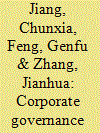

|
|
|
|
|
| Publication |
2012.
|
| Summary/Abstract |
This paper examines the effects of corporate governance on bank performance in China over the period 1995-2008. Bank performance has improved significantly and the mean profit efficiency level is estimated at 61%. The results suggest that differences in corporate governance have significant impacts on bank performance: banks with majority foreign ownership are most profitable while banks with majority state ownership are most unprofitable. We find no evidence that foreign minority ownership in domestic banks improves performance. Banks with more dispersed ownership are found to be more profit efficient.
|
|
|
|
|
|
|
|
|
|
|
|
|
|
|
|
| 8 |
ID:
053005


|
|
|
| 9 |
ID:
135065


|
|
|
|
|
| Summary/Abstract |
Is the harmonization of financial regulatory regimes possible in East Asia? Focusing on corporate governance, which many see as a critical part of the 1997 Asian financial crisis, and which is also seen as unresponsive to calls for change, this paper argues that such harmonization is possible, but that it will not be according to the standards advocated by the International Monetary Fund, World Bank, Organisation for Economic Co-operation and Development, and other international organizations. At present, actors generally feign compliance with these international rules and standards. The pattern of noncompliance is reflective of two types of regulatory models at work in East Asia, which correspond to democratic and nondemocratic regimes. The manner by which these political institutions mediate the influence of key actors determines corporate governance outcomes. Three cases illustrate the key dynamics: Singapore (nondemocracy), South Korea (democracy), and pre- and post-World War II Japan (change from nondemocracy to democracy). By identifying the key actors that determine regulatory outcomes, this paper points to a more realistic regulatory framework. This alternative framework is a compromise between the standards advocated by international organizations and the domestic political realities of East Asia.
|
|
|
|
|
|
|
|
|
|
|
|
|
|
|
|
| 10 |
ID:
084163
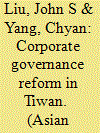

|
|
|
| 11 |
ID:
185621
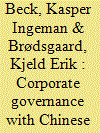

|
|
|
|
|
| Summary/Abstract |
This article analyses the role of the Chinese Communist Party (CCP) in the corporate governance of Chinese state-owned enterprises (SOEs), including a case study of a central-level SOE holding group. Relying on official documents, secondary literature and interviews with enterprise managers, government officials and academics, the article documents how the CCP has actively formalized its role in Chinese business by embedding itself in the corporate governance structure of SOEs. Through the application of Chinese indigenous administrative corporate governance concepts such as “bidirectional entry, cross appointment” and “three majors, one big,” the CCP has consolidated its dominance of enterprise decision-making procedures and personnel appointment and created a hybrid, Party-led model of corporate governance. While this hybrid model can secure enterprise compliance, communication with higher state and Party organs, as well as long-term development planning, it is unlikely to help solve SOE efficiency problems and may even undermine other SOE reforms.
|
|
|
|
|
|
|
|
|
|
|
|
|
|
|
|
| 12 |
ID:
140251
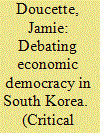

|
|
|
|
|
| Summary/Abstract |
In the 2012 Korean presidential election, both liberal and conservative parties fought their campaigns on the slogan of “economic democratization,” marking a strong departure from past presidential elections and the growth-first policies of the then-incumbent conservative administration. Both parties pledged to tackle growing social polarization and the concentration of economic power by reforming the corporate governance of Korea's large, family-led conglomerates (chaebol), to the degree that chaebol reform itself became synonymous with economic democratization. This focus led to a series of heated exchanges among liberal-left reformers about the vision of economic democratization being promoted, with one camp favoring the creation of a “fair market” through the restructuring of the chaebol and another promoting the protection of the chaebol’s management rights over their affiliates as a desirable strategy for the creation of a Korean welfare state. This essay examines the long-standing tensions between these two liberal-left perspectives and argues that the capital-centric and market-based visions these camps promoted risk confining intellectual debate over the meaning of economic democracy within boundaries that serve dominant political interests.
|
|
|
|
|
|
|
|
|
|
|
|
|
|
|
|
| 13 |
ID:
137533


|
|
|
|
|
| Summary/Abstract |
This paper examines the relationship between ownership structures and IPO long-run performance of non-SOEs in China. Although non-SOEs underperform the market in general after IPO but the poor performance is mainly caused by the IPOs with ownership control wedge. Non-SOEs with one share one vote structure outperform those with control-ownership wedge by 30% for three years post-IPO performance in adjusted buy-and-hold returns. Non-SOEs with control-ownership wedge have higher frequency of undertaking value-destroying related party transactions. These findings suggest that non-SOEs need to improve corporate governance such as disproportionate ownership structure to better safeguard the interest of long-run shareholders.
|
|
|
|
|
|
|
|
|
|
|
|
|
|
|
|
| 14 |
ID:
141176
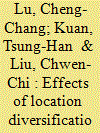

|
|
|
|
|
| Summary/Abstract |
This study investigates the location choice performance of foreign direct investment (FDI) originating from small- and medium-sized multinational enterprises established in newly industrialized economies. In this study we integrate location diversification, breadth and corporate governance to examine the performance of Taiwanese enterprises investing in Chinese mainland. Examining Taiwanese manufacturing enterprises from foundational, traditional and high-technology aspects, our findings demonstrate the following: (i) diversifying the location choice negatively affects the return of assets; (ii) investments in regions with an abundant population positively affect the performance of Taiwanese traditional manufacturing enterprises; and (iii) a higher percentage of insider holdings in Taiwanese enterprises results in better FDI performance. We conclude that the performance of FDI originating from Taiwanese enterprises varies depending on industrial and governance characteristics. We suggest that the location choice for Taiwan FDI in Chinese mainland should be determined by the characteristics of the industry. Chinese mainland should attract multinational enterprises from emerging markets according to the characteristics of regions.
|
|
|
|
|
|
|
|
|
|
|
|
|
|
|
|
| 15 |
ID:
173877


|
|
|
|
|
| Summary/Abstract |
This study explores the influence of corporate governance practices in corporate boards on firm performance and draws insights on the relative importance for companies for fostering the development of governance mechanisms in business. The study examines 50 firms belonging to the benchmark index of the National Stock Exchange of India (NIFTY 50) and tracks them for over a five-year period. The study uses fixed and random effect econometric models to explore the relationship between corporate governance variables, and firm performance using both accounting returns (EVA, ROA and ROE) and market returns (MVA). The study finds that corporate governance variables significantly improve firm performance or value creation. Especially, multiple directorships, involvement of foreign institutional investors and increase in promoter holdings may significantly affect returns of the firm. The study suggests that it may be useful to foster better corporate governance practices and monitor linkages with firm performance as the effect is influenced by other control variables also.
|
|
|
|
|
|
|
|
|
|
|
|
|
|
|
|
| 16 |
ID:
090938
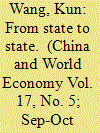

|
|
|
|
|
| Publication |
2009.
|
| Summary/Abstract |
This paper uses a sample of Chinese listed companies whose controlling shareholders have changed from government agencies to state-owned enterprises (SOEs), to examine whether reducing government intervention while maintaining government's ultimate control could improve firm performance. The results show that the overall performance of these firms improves after the transfer of their controlling shareholders, due to improvements in both operating and non-operating performance. When we separate all samples into solely SOEs and other SOEs based on the controlling shareholder, we find that operating performance improved significantly in the solely SOE group, whereas non-operating performance improved significantly in the SOE group. In addition, we identify sources of performance improvement from two perspectives: corporate governance and related party transactions. The results imply that the Chinese Government should continue to decentralize control and, at the same time, continue to monitor firm operating efficiency.
|
|
|
|
|
|
|
|
|
|
|
|
|
|
|
|
| 17 |
ID:
182762


|
|
|
|
|
| Summary/Abstract |
This paper investigates the impact of social trust on a firm's adjustment speed toward an optimal capital structure. Leveraging the availability of generalized trust and personalized trust metrics in China, we find that, as expected, when a firm is located in a high social trust region (with either generalized or personalized trust), it adjusts more quickly toward its target capital structure. Moreover, we document that the impact of generalized trust (personalized trust) on the adjustment speed is magnified if the firm already had stringent financial constraints (less-severe agency problems) but it is not related to the severity of a firm's agency problems (financial constraints). Additional analysis suggests that the impact of social trust on capital structure dynamics is primarily through debt rather than equity. Furthermore, we find that when a firm is located in a weak formal institutional environment, the impact of generalized trust on the adjustment speed strengthens, suggesting that formal institutions and generalized trust are partial substitutes. Interestingly, the substitution effect of formal institutions and personalized trust is weak. Hence, the impact of generalized trust and personalized trust on capital structure adjustment share some similarities but differ in other respects.
|
|
|
|
|
|
|
|
|
|
|
|
|
|
|
|
| 18 |
ID:
046085


|
|
|
|
|
| Publication |
New York, Palgrave, 2001.
|
| Description |
xiv, 133p.Hbk
|
| Standard Number |
0333961277
|
|
|
|
|
|
|
|
|
|
|
|
Copies: C:1/I:0,R:0,Q:0
Circulation
| Accession# | Call# | Current Location | Status | Policy | Location |
| 046785 | 658.4/KAK 046785 | Main | On Shelf | General | |
|
|
|
|
| 19 |
ID:
115870
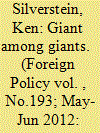

|
|
|
| 20 |
ID:
049496


|
|
|
|
|
| Publication |
Cambridge, Visions of Governance in the 21st Century, 2001.
|
| Description |
viii, 354p.
|
| Standard Number |
0815702019
|
|
|
|
|
|
|
|
|
|
|
|
Copies: C:1/I:0,R:0,Q:0
Circulation
| Accession# | Call# | Current Location | Status | Policy | Location |
| 045797 | 322.30973/DON 045797 | Main | On Shelf | General | |
|
|
|
|
|
|
|
|
|